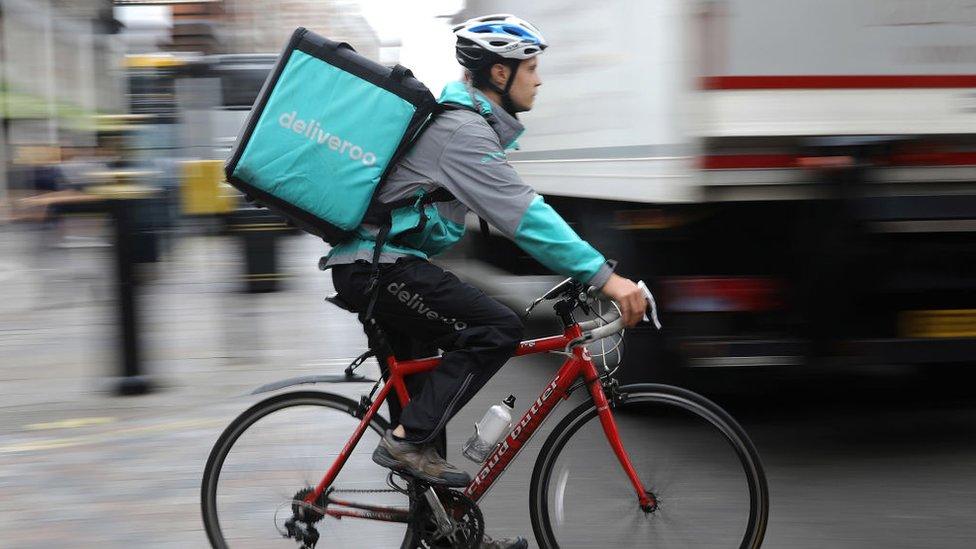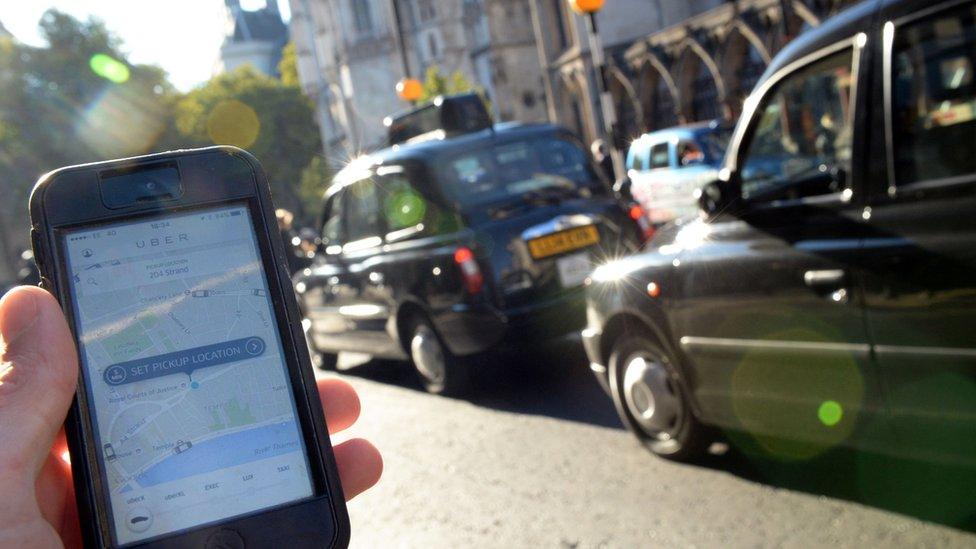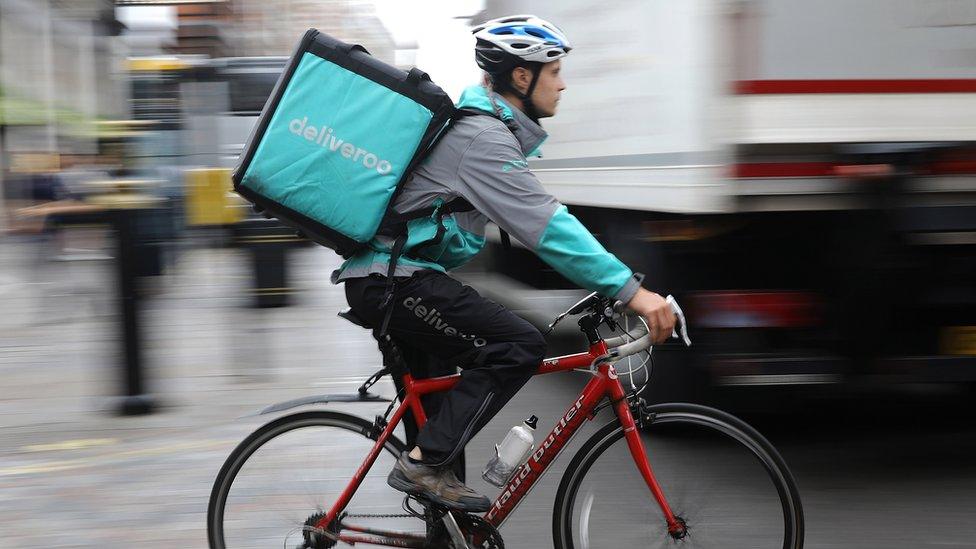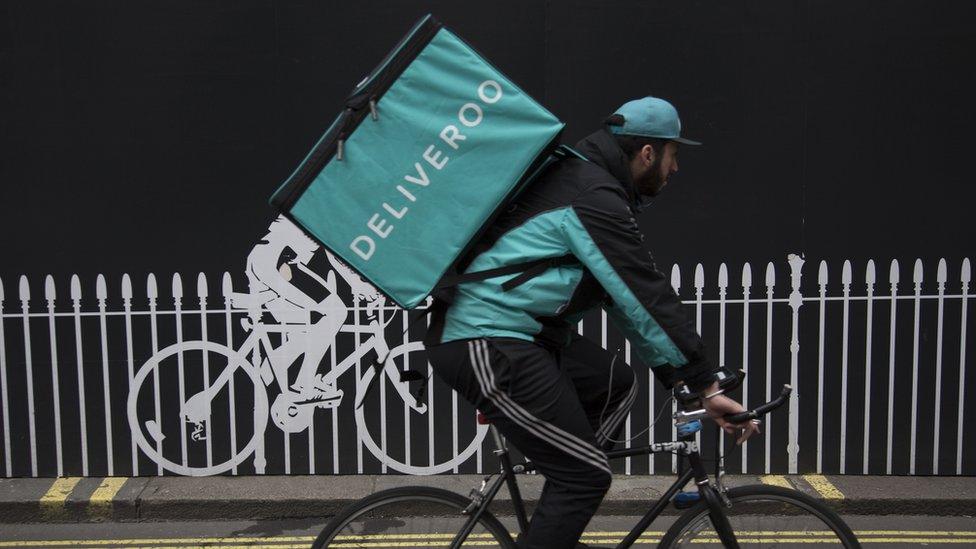Fresh call for crackdown on gig economy
- Published
- comments

Firms in the "gig economy" are exploiting loopholes in employment law leaving workers worse off, say MPs.
Minicab drivers and delivery riders face an "unacceptable burden" of having to prove they are "workers" not self-employed, two Commons committees say.
They suggest that companies should be fined if they falsely classify workers and deny them benefits.
A spokeswoman said the government recognised the "labour market is not working for everyone".
She said that was why the government had commissioned Matthew Taylor, chief executive of the Royal Society of the Arts, to review employment practices.
The Work and Pensions Committee and the Business Select Committee have drawn up a draft bill which would assume "worker by default", to make firms pay holiday and sick pay.
Frank Field, the Labour chairman of the Work and Pensions Committee, said the draft bill would "end the mass exploitation of ordinary, hard-working people in the gig economy".
"It is time to close the loopholes that allow irresponsible companies to underpay workers, avoid taxes and free ride on our welfare system," he said.
The committees said that fines levied against firms would make sure that "the risks of being caught outweigh the gains companies stand to make from illegal practices".
Mr Taylor's report, published in July, called for reform of the law so that gig workers are reclassified as dependent contractors who could then maintain flexibility whilst receiving statutory benefits.
"We are considering his report carefully and will respond in due course," a government spokeswoman said.

Uber says its workers are self-employed
Gig economy businesses like Uber and Deliveroo insist their workers are self-employed, although Uber has lost several legal cases on the issue.
"Self-employed" workers who log on to the gig-business technology platform to find work do not automatically receive statutory benefits.
The firms say gig workers value the flexibility such "on-demand" working provides.

What is the gig economy?
In the gig economy, instead of a regular wage, workers get paid for the "gigs" they do, such as a food delivery or a car journey.
In the UK, it is estimated that one million people are employed in this type of capacity.
Jobs include couriers, ride-hailing drivers and video producers.
Workers in the gig economy are classed as independent contractors.
That means they have no protection against unfair dismissal, no right to redundancy payments, and no right to receive the national minimum wage, paid holiday or sickness pay.


Rachel Reeves, the Labour chairwoman of the Business Select Committee, said that workers rights should not be sacrificed for flexibility.
"Uber, Deliveroo and others like to bang the drum for the benefits of flexibility for their workforce but currently all the burden of this flexibility is picked up by taxpayers and workers," she said, referring to the fact that gig firms do not have to pay the same rates of tax as businesses which employ staff on full-time or part-time contracts.
"This must change. We say that companies should pay higher wages when they are asking people to work extra hours or on zero-hours contracts.
"Recent cases demonstrate a need for greater clarity in the law to protect workers."
Ms Reeves also said that employment tribunals should consider higher fines for any firm found to have breached the law.
Companies like Deliveroo, which recently won a case on the self-employed status of its riders before the Central Arbitration Committee, said that the law on self-employment prevented them offering statutory rights.
"Deliveroo riders are self-employed for one reason only, it allows them to work flexibly, which riders tell us is exactly what they want," a spokesman said.
"Riders make on average £9.50 an hour with Deliveroo, well above the National Living Wage.
"Alongside this flexibility and good pay, we want to offer riders more security - such as injury pay and sick pay. At the moment the law prevents us from doing so.
Mr Taylor has urged the government to act.
"The government should note that there is now cross party support for legislation in key areas like extra pay for non-guaranteed hours, a day one statement of rights and conditions and making it much easier for all workers to have independent representation," he told me.
- Published14 November 2017

- Published10 February 2017

- Published11 July 2017
